Sleep Apnea Secondary Conditions: The Definitive Guide
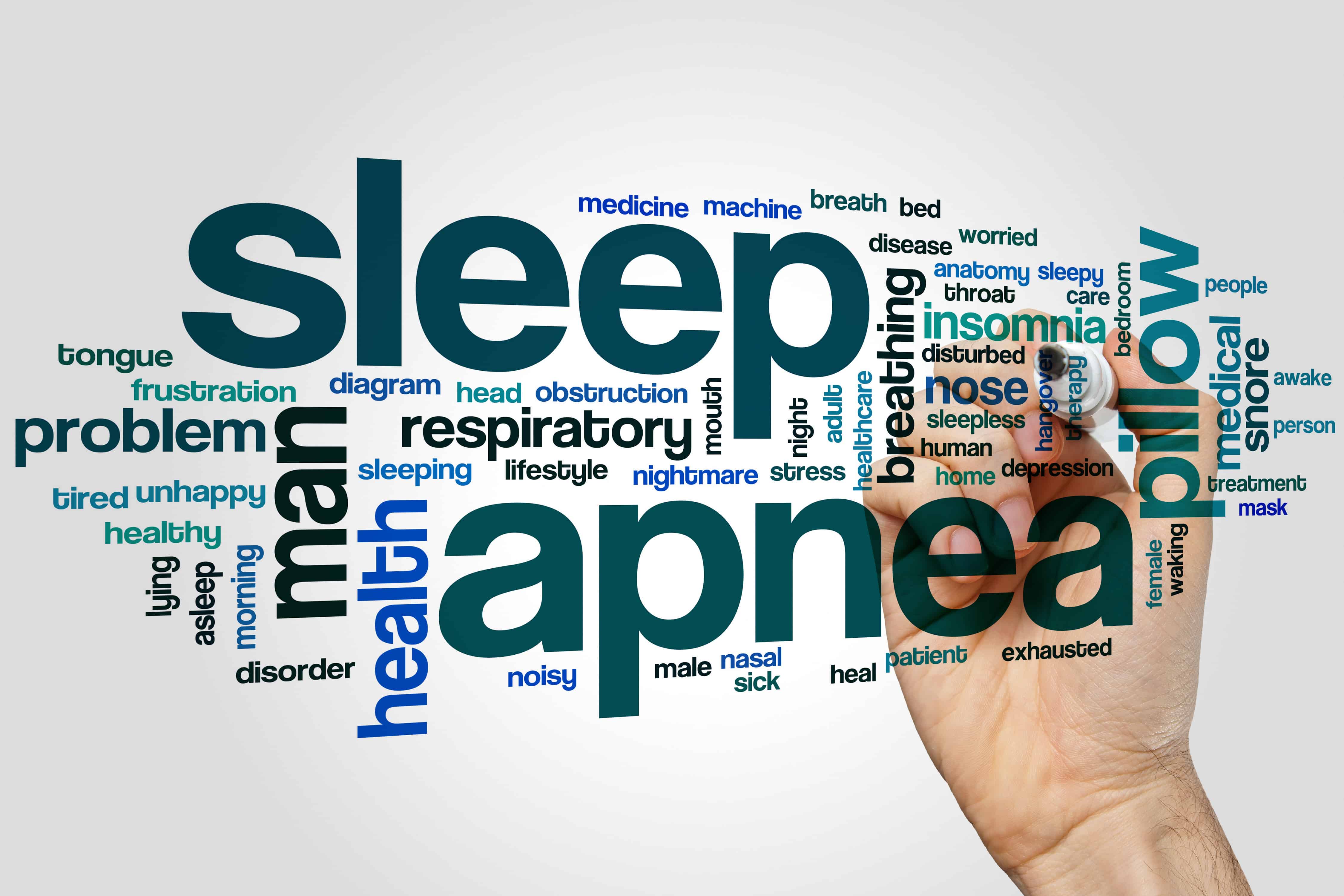
Veterans, in this post I list more than 50 possible sleep apnea secondary conditions so veterans can win, service-connect, and rate your sleep apnea VA claim in less time.
Many veterans attempt to service-connect sleep apnea as a primary disability condition and can’t seem to figure our “why” the VA keeps denying your sleep apnea claim.
The main problem is that you didn’t get a medical diagnosis of sleep apnea while on active duty and you never did a sleep study.
I can literally read the VA’s denial letter now: “There is no evidence in the veterans service treatment records of any sleep apnea condition or subjective complaints of sleep apnea.”
Of course there isn’t VA!
Why?
Because you didn’t go to the doctor enough while you were on active duty, and furthermore, you probably didn’t even know what sleep apnea was during you service.
You’re not alone here veterans!
When I was on active duty, I had a ton of sleep issues, but I never realized those symptoms might have been due to an underlying sleep apnea condition.
I chalked it up to long work hours, stress from the job, a deployment, and various mental health issues.
You might also like the following sleep apnea blog posts:
- Sleep Apnea secondary to PTSD it’s time to start thinking outside the box!
- Spousal letter supporting sleep apnea
- How to file a VA claim for sleep apnea
- What are my options for sleep apnea
- What is Sleep Apnea?
- How Many Veterans Have Sleep Apnea?
- Sleep Apnea Secondary Conditions SECRETS
- Sleep Apnea as a Secondary Claim
- Top 3 Most Common VA Sleep Apnea Secondary Conditions
- List of 50+ Possible Sleep Apnea Secondary Conditions
- Need an Independent Medical Opinion (IMO) to help service-connect your sleep apnea VA claim?
- About the Author
What is Sleep Apnea?
Sleep apnea is a very serious sleep disorder, whereby breathing is briefly and repeatedly interrupted during sleep.
The “apnea” also called “apneic episodes” in sleep apnea refers to a breathing pause that lasts approximatley 10 seconds or more.
Obstructive sleep apnea, which is the most common type of sleep apnea, occurs when the muscles in the back of the throat relax and fail to keep the upper airway open, which prevents you from breathing properly.
Another type of sleep apnea is central sleep apnea, in which the brain fails to properly control breathing during sleep.
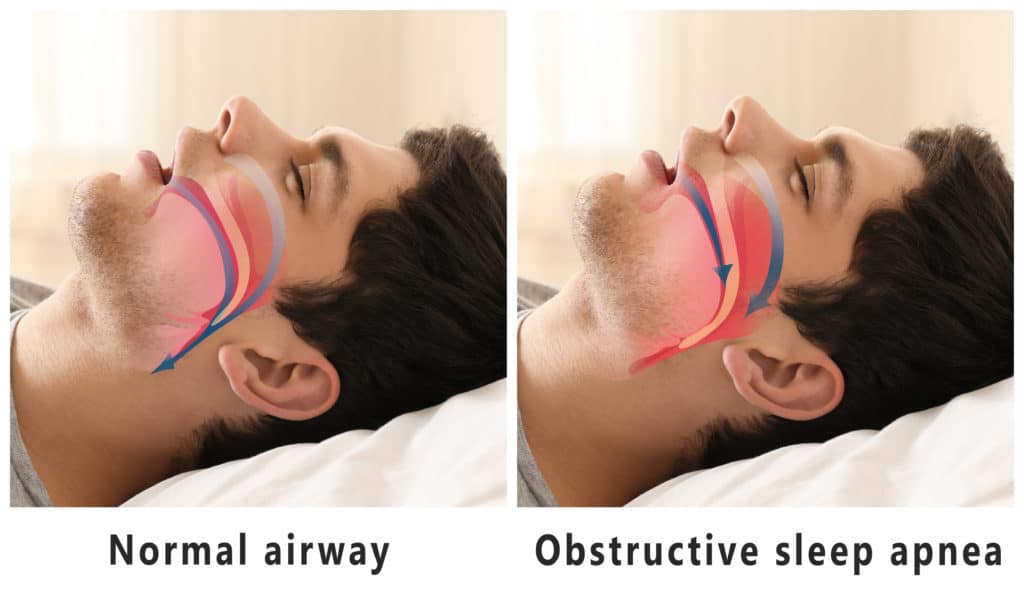
How Many Veterans Have Sleep Apnea?
A lot. According to medical research, military veterans are FOUR TIMES (4x) more likely to have sleep apnea than the normal civilian population, a truly staggering number…
The major problem for your sleep apnea VA claim, however, is that you probably were NOT diagnosed with sleep apnea on active duty.
Further compounding the issue is there seems to be resistance among military clinics worldwide from ordering-up sleep studies for active duty military members.
But, maybe there’s a better way to service-connect your sleep apnea claim even if you’ve already filed or been denied?
Good news, there is a better way and there’s a laundry list of possible sleep apnea secondary conditions.
So, here’s the opinion of VA Claims Insider: If you did NOT have a sleep study while on active duty and you did NOT get a diagnosis of sleep apnea on active duty, you should attempt to service connect your sleep apnea VA claim secondary to another service-connected disability rated at 0 percent or higher.
Quick note: You MUST have a medical diagnosis of sleep apnea and that must be confirmed by a sleep study (it’s okay if this diagnosis and sleep study occurred years AFTER leaving active duty).
Like my comments toward the beginning of this post, most veterans didn’t realize they had sleep apnea while on active duty.
BUT, you must act now, and you must get a sleep study from a VA doctor or a private doctor.
Secret hack: You can also order a sleep study at-home test kit if you don’t want to wait for the VA or private doctor.
Okay, let’s explore how you can service connect sleep apnea secondary.
Sleep Apnea Secondary Conditions SECRETS
In this video, Brian Reese the VA Claims Insider shares: “Sleep Apnea Secondary Conditions SECRETS!”
Sleep Apnea Secondary VA Claim – Timestamps and Direct Links
- ⏩0:40 VA Claims Insider Disclaimer
- ⏩5:07 Differences between Obstructive, Central and Mixed Sleep Apnea
- ⏩6:03 Here is WHY Sleep Apnea Claims get DENIED!
- ⏩14:55 The PROBLEM with filing Sleep Apnea as DIRECT SERVICE CONNECTION
- ⏩22:46 Sleep Apnea Secondary Conditions
- ⏩24:58 Service Connection on a Secondary Basis
- ⏩30:29 What are LIKELY causes of Sleep Apnea
- ⏩46:49 How long does a Higher Level Review (HLR) take?
- ⏩49:19 Filing for an INCREASE on your Sleep Apnea Disability Claim
- ⏩51:38 Buddy Letter & Spousal Letters for VA Claims
Sleep Apnea as a Secondary Claim
Service connection on a secondary basis requires a showing of causation.
A showing of causation requires that the secondary disability be shown to be “proximately caused by” or “proximately aggravated by” another service-connected disability.
By law, there are three evidentiary elements that must be satisfied for sleep apnea secondary conditions to prove secondary service connection:
- A medical diagnosis of sleep apnea confirmed by a sleep study in VA medical records or private records (unless you did this already on active duty)
- Evidence of a service-connected primary disability (such as PTSD, depression, anxiety, sinusitis, rhinitis, weight gain), AND
- Medical nexus evidence establishing a connection between the service-connected disability and the current disability
The first part can be satisfied with any existing medical evidence in service treatment records, VA medical records, or any private medical records.
The second part can be satisfied with a veteran’s existing service-connected disability rated at 0 percent or higher.
The third part can be satisfied with a medical nexus letter from a qualified medical professional.
Did you know there are more than 50 conditions that can be medically linked to cause or aggravate sleep apnea?
Trying to service-connect sleep apnea secondary to PTSD? Click HERE to read now.
Top 3 Most Common VA Sleep Apnea Secondary Conditions
- #1 Sleep Apnea secondary to PTSD
- #2 Sleep Apnea secondary to Sinusitis
- #3 Sleep Apnea secondary to Medication Side Effects (weight gain from medication side effects used as an interim link)
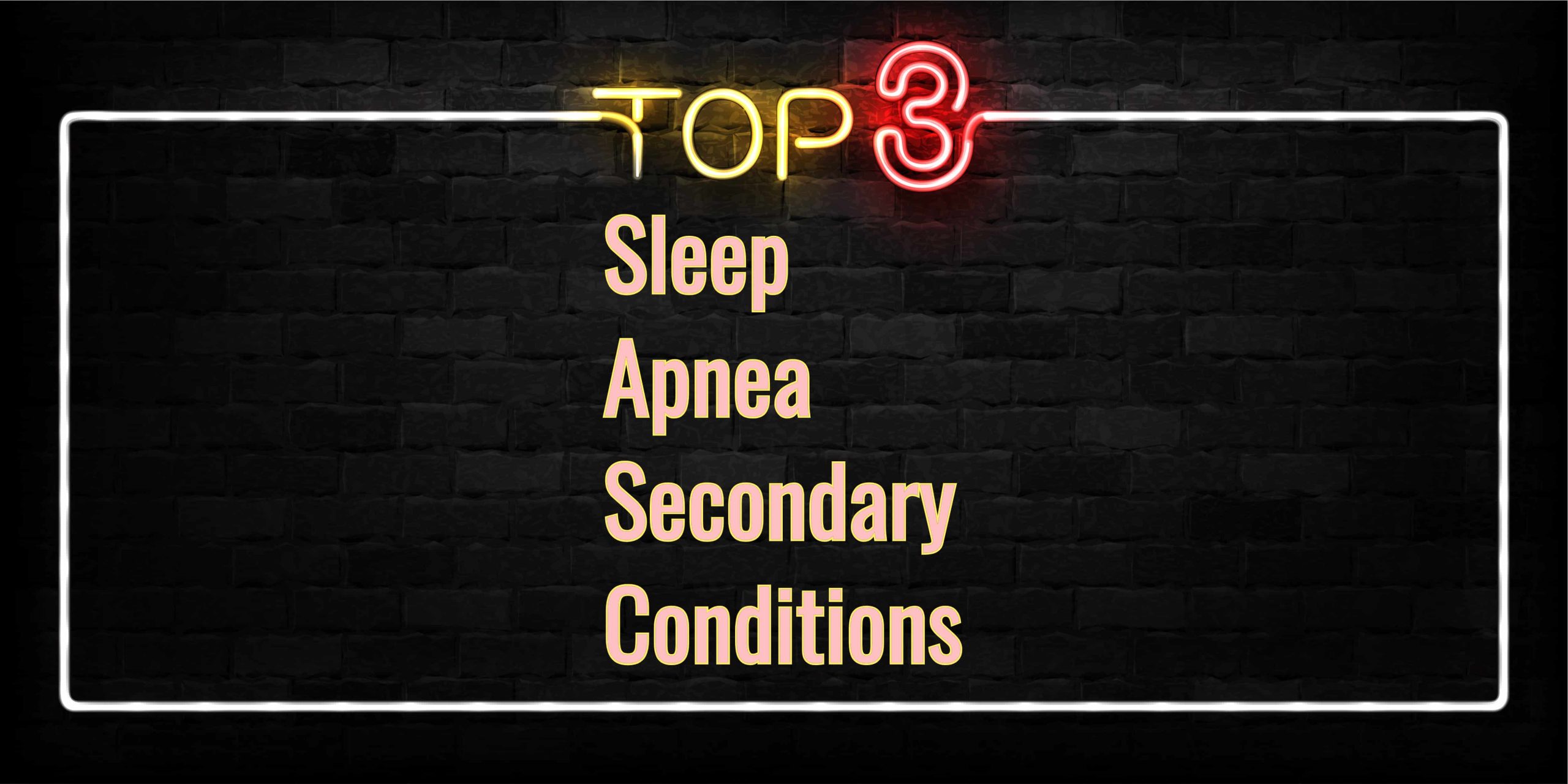
List of 50+ Possible Sleep Apnea Secondary Conditions
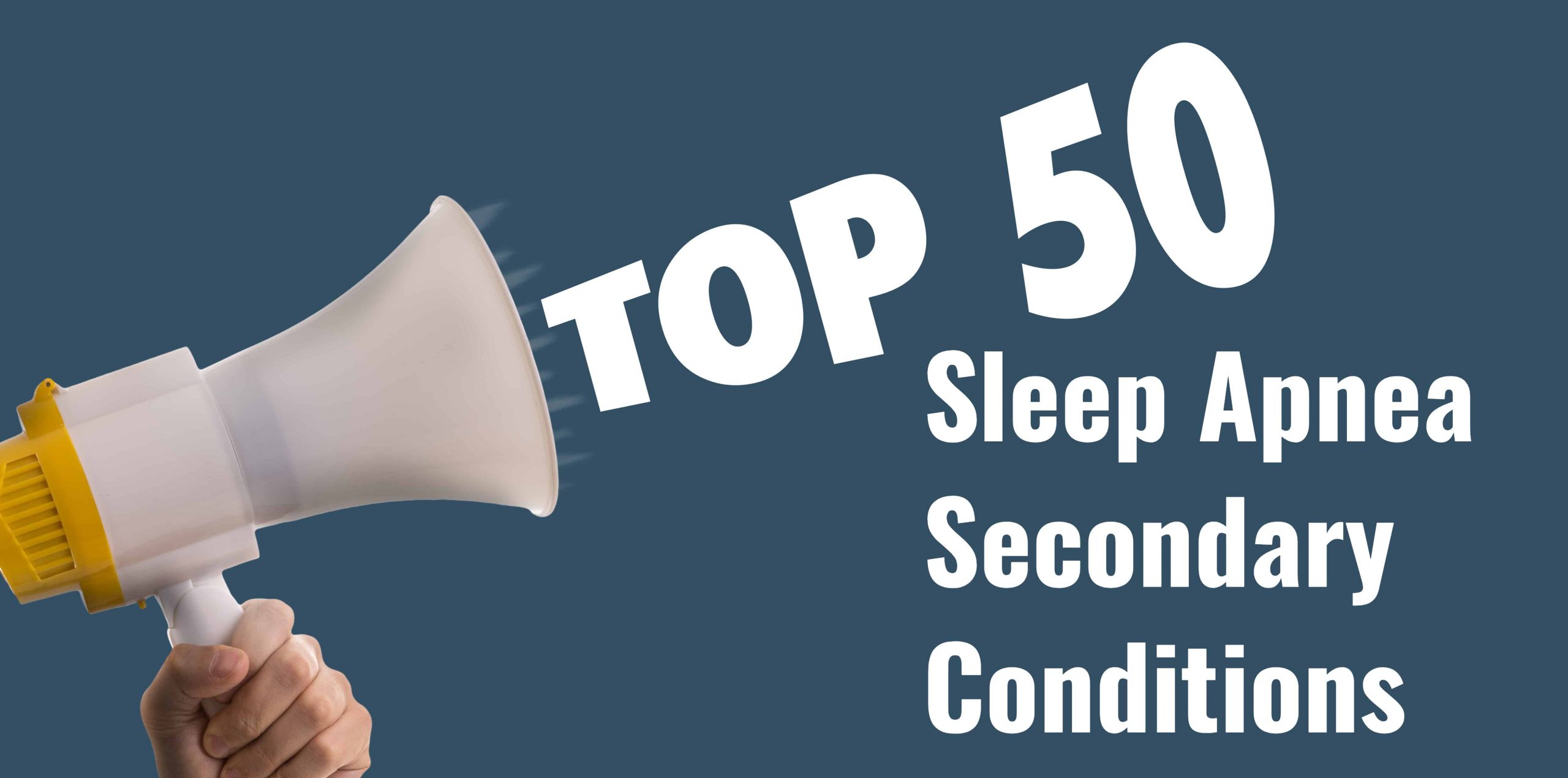
- Sleep Apnea secondary to Allergic Rhinitis
- Sleep Apnea secondary to Amyotrophic Lateral Sclerosis (ALS)
- Sleep Apnea secondary to Anxiety
- Sleep Apnea secondary to Asthma
- Sleep Apnea secondary to Atrial Fibrillation
- Sleep Apnea secondary to Back Pain
- Sleep Apnea secondary to Brain Infections or swelling of the brain
- Sleep Apnea secondary to Brainstem or Spinal Cord
- Sleep Apnea secondary to Cervical Nerve conditions
- Sleep Apnea secondary to Cervical Spine Injuries
- Sleep Apnea secondary to Chemicals or Toxins exposure
- Sleep Apnea secondary to Chronic Fatigue Syndrome
- Sleep Apnea secondary to Chronic Pain
- Sleep Apnea secondary to Chronic Sinusitis
- Sleep Apnea secondary to Lung Condition
- Sleep Apnea secondary to conditions that interfere with the jaw, tongue, or nose
- Sleep Apnea secondary to Congestive Heart Failure
- Sleep Apnea secondary to Depression
- Sleep Apnea secondary to Deviated Septum
- Sleep Apnea secondary to Diabetes
- Sleep Apnea secondary to Encephalitis
- Sleep Apnea secondary to Fatigue
- Sleep Apnea secondary to Fibromyalgia
- Sleep Apnea secondary to GERD
- Sleep Apnea secondary to Gulf War Syndrome
- Sleep Apnea secondary to Heart Attack
- Sleep Apnea secondary to Heart Disease
- Sleep Apnea secondary to Heart Rhythm Disorders
- Sleep Apnea secondary to High Blood Pressure
- Sleep Apnea secondary to Hypertension
- Sleep Apnea secondary to Hypothyroidism
- Sleep Apnea secondary to Insomnia
- Sleep Apnea secondary to Insulin Resistance
- Sleep Apnea secondary to Liver Disease
- Sleep Apnea secondary to Obesity
- Sleep Apnea secondary to Parkinson’s Disease
- Sleep Apnea secondary to Polycythemia (High Red Blood Cell Count)
- Sleep Apnea secondary to Post-Traumatic Stress Disorder (PTSD)
- Sleep Apnea secondary to Progressive Lateral Sclerosis (PLS)
- Sleep Apnea secondary to Progressive Muscular Atrophy
- Sleep Apnea secondary to Restless Leg Syndrome
- Sleep Apnea secondary to Sinusitis
- Sleep Apnea secondary to Seizure Disorders (e.g., Epilepsy)
- Sleep Apnea secondary to Stenosis
- Sleep Apnea secondary to Stroke
- Sleep Apnea secondary to Temporomandibular Joint Syndrome (TMJ)
- Sleep Apnea secondary to Tinnitus
- Sleep Apnea secondary to Tonsillitis
- Sleep Apnea secondary to Traumatic Brain Injury (TBI)
- Sleep Apnea secondary to Medication Side Effects (weight gain from medication side effects used as an interim link)
Need an Independent Medical Opinion (IMO) to help service-connect your sleep apnea VA claim?
VA Claims Insider ELITE is our premier program, which utilizes our proprietary medical process to identify gaps in your record to ensure (1) service-connection of your current disabilities, and (2) the highest rating possible under the law.
If you need a Medical Nexus Letter from a qualified doctor to service connect your VA sleep apnea claim secondary to another disability, click HERE now and complete our FREE 3-step intake.
==> Click HERE to apply for FREE: www.vaclaimsinsiderelite.com <==
About the Author
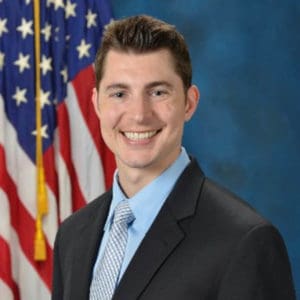
Brian Reese is a VA disability expert, and founder of VA Claims Insider, “The Most Trusted Name in Education-Based Resources for Veterans.”
He is an Air Force service-disabled veteran, and his personal frustration with the VA claim process led him to found VA Claims Insider in 2016, which provides veterans with expert-level resources for successfully submitting a winning VA disability claim.
He is also the CEO of Military Disability Made Easy, the world’s largest repository of VA disability claim information with linkages to specific medical conditions, which has served more than 4,600,000 veterans, VSOs, attorneys, medical professionals, and disability advocates since its founding in 2013.
His eBook, “The 9 Secret Strategies for Winning Your VA Disability Claim,” has been downloaded more than 300,000 times in the past three years and is the #1 rated free VA disability claims guide for veterans.
Brian is a former active duty Air Force officer with extensive experience leading hundreds of individuals and multi-functional teams in challenging international environments, including a combat tour to Afghanistan in 2011.
Brian is a Distinguished Graduate of Management from the United States Air Force Academy and holds an MBA from Oklahoma State University’s Spears School of Business, where he was a National Honor Scholar (Top 1% of Graduate School class).

